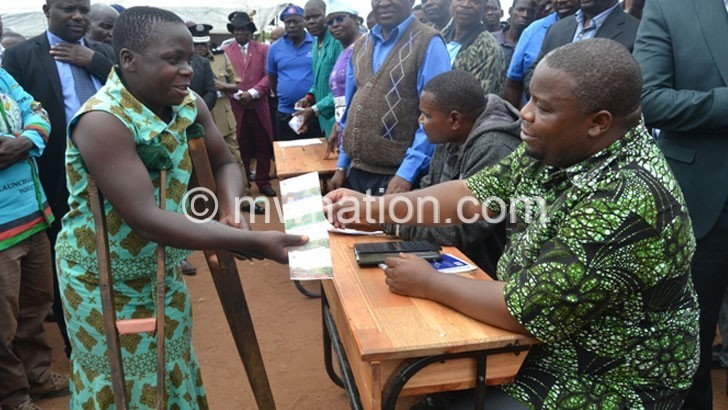IMF says Fisp, other subsidies inefficient
International Monetary Fund (IMF) has described subsidies in sub-Saharan Africa, including Malawi’s Farm Input Subsidy Programme (Fisp), as inefficient and in need of immediate review to become more effective.
But Ministry of Agriculture, Irrigation and Water Development has said it will continue improving the programme to achieve its objective of attaining national food security.
The IMF’s observation comes against a background of critics of Fisp, including Economics Association of Malawi (Ecama), pushing for an exit strategy. The critics observe that Malawi is entangled in a vicious cycle where billions of kwacha are spent subsidising about 900 000 smallholder farmers who end up requiring relief food from the same public purse after poor harvest.

In its latest Regional Economic Outlook for Sub-Saharan Africa, the IMF has stressed the need for governments in the region to streamline the highlighted inefficient subsidies such as Fisp.
The report says subsidies and other transfers from governments averaged over five percent of gross domestic product (GDP) or 25 percent of expenses as of 2017.
Reads the report: “Fuel subsidies tend to be poorly targeted, foster overconsumption, curtail investment and maintenance in related sectors and crowd out more productive government spending. There is also a scope to reexamine how to improve the effectiveness of other types of subsidies [for example, Malawi’s Farm Input Subsidy Programme]
.”
For Fisp, the IMF has suggested several reform areas to boost efficiency, including comprehensive reform plan, far-reaching communication strategy and improvements in transparency.
Reads the report: “[There should also be] improvement in the efficiency of State-owned enterprises to reduce producer subsidies, targeted measures to protect the poor; and institutional reforms that depoliticise energy pricing, such as the introduction of automatic pricing mechanisms.”
The IMF’s recommendations are not new as its communique on the Consultation and Request for a Three-Year Arrangement Under The Extended Credit Facility in 2018, also urged government to make Fisp reforms.
Then the IMF advised: “Fisp should be redesigned to reduce the subsidy rate, introduce fixed value coupons, increase private sector participation in fertiliser distribution and better target of the beneficiaries.
“The savings from Fisp reforms could be used to expand coverage of social cash transfers, proven to be more effective than Fisp in alleviating poverty.”
Besides Ecama and the IMF, other donor partners and Malawi Economic Justice Network (Mejn) have also argued that Fisp is inefficient, poorly targeted and hurts economic diversification.
They highlight challenges ranging from corruption, over-pricing, delays in dispatching inputs to remote areas and selection of beneficiaries to redeeming of coupons by beneficiaries as well as sustainability as critical.
In an interview on Tuesday, agriculture analyst Tamani Nkhono Mvula agreed with the IMF, saying the current status of the programme shows high levels of inefficiency unlike during its first three years.
He said the level of investment and benefits do not match, and that it has become a tool for some few people to benefit, at the expense of poor Malawians.
Said Nkhono Mvula: “Politicians are failing to make the decision to phase it out because of the high political cost it may have. But we need people that have to make those decisions at the right time, unfortunately the ones we have now are benefiting from this chaos and can’t.”
In an earlier interview, Catholic University dean of social sciences Gilbert Kachamba indicated that Fisp is a waste of resources, but a good short-term strategy to deal with food shortages.
But Ministry of Agriculture, Irrigation and Water Development spokesperson Priscilla Mateyu yesterday said the ministry has put in place a monitoring task force after noting the challenges experienced in the implementation of Fisp in the past.
She said the task force is assessing issues such as quality and quantity of inputs, coupons and uptake of inputs to ensure successful implementation of the programme.
Said Mateyu: “The ministry will continue to make improvements of the programme to make sure that it meets the intended goal of improving food security.
“This year has been one of the most successful in terms of Fisp implementation in recent years because the programme has been managed timely. Coupon distribution started in October unlike previous years.”
Speaking during the launch of this year’s programme in Phalombe, Minister of Agriculture, Irrigation and Water Development Kondwani Nankhumwa said government will disqualify from or terminate an existing contract or ban a supplier from participating in future Fisp contracts.
The ministry has also introduced a toll-free number (60606) under Airtel for the public to report any malpractice observed or experienced regarding Fisp.
In its input into the 2019/20 National Budget, Mejn proposed to government a gradual reduction of Fisp beneficiaries and investment.
This year, the ministry has awarded contracts to 57 private suppliers and two public institutions—Agricultural Development and Marketing Corporation and Smallholder Farmers Fertiliser Revolving Fund of Malawi—to sell different commodities under Fisp.
Since its inception in 2005, Malawi has invested over K400 billion in the programme, raising calls from other commentators including for government to abolish it on the basis of not achieving its intended purpose.





